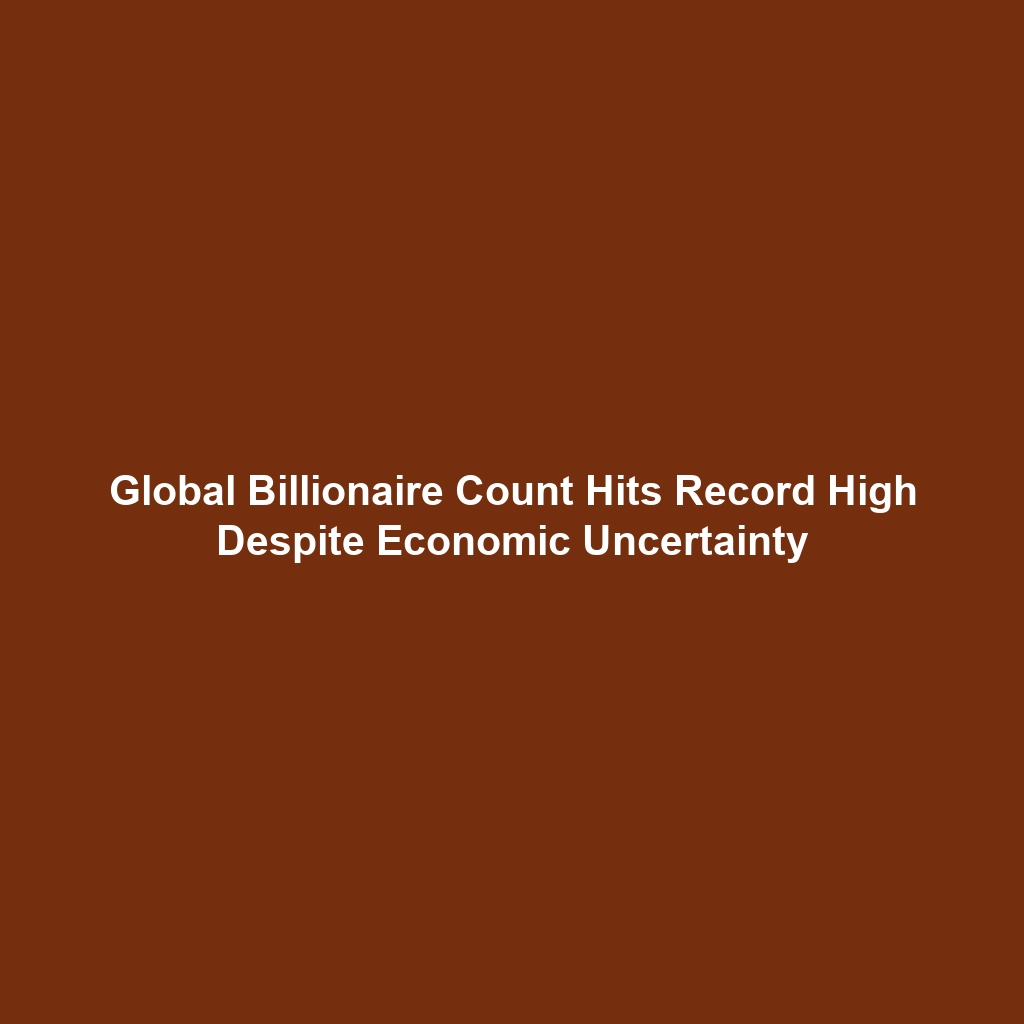Your cart is currently empty!
Tag: socio-economic implications

Global Billionaire Count Hits Record High Despite Economic Uncertainty
Global Billionaire Count Hits Record High Despite Economic Uncertainty
Global Billionaire Count Hits Record High Despite Economic Uncertainty
The number of billionaires worldwide has reached an all-time high, with a record 2,640 individuals now qualifying for this elite financial status. This unprecedented surge in wealth accumulation occurs amidst widespread economic uncertainty and challenges triggered by the COVID-19 pandemic, geopolitical tensions, and inflationary pressures.
Wealth Distribution and Concentration
According to data released by Forbes, the global billionaire count has increased significantly in recent years, reflecting a trend of extreme wealth concentration. In 2023 alone, the combined net worth of the world’s billionaires rose to $12.2 trillion, marking an increase of $2 trillion from the previous year. This phenomenon raises important questions about income inequality and the socio-economic implications of such concentrated wealth.
A substantial portion of this wealth is concentrated in the technology and finance sectors, with figures indicating that at least 50% of the world’s billionaires derive their fortunes from these industries. Experts argue that advancements in technology and digital finance have accelerated wealth creation, even as many individuals and families continue to struggle economically.
Regional Insights
The United States continues to lead in billionaire wealth, hosting 735 individuals with a total net worth exceeding $4.5 trillion. The increase in American billionaires is often attributed to the booming stock market and the rapid growth of tech companies during the pandemic. Notably, business magnates such as Elon Musk and Jeff Bezos frequently highlight the impact of innovation on wealth generation.
In contrast, billionaire growth in regions like Asia has been marked by the sharp rise of entrepreneurs in emerging markets. For example, India has seen a surge in billionaires with a record of 169 individuals in 2023, supported by budding sectors like e-commerce and renewable energy. This shift demonstrates the changing landscape of global wealth as highlighted by economist Dr. Linda Zhang, who states, “Emerging markets are becoming increasingly significant players in the world economy, creating opportunities for wealth generation that were previously unavailable.”
Challenges and Criticisms
Despite the growth in billionaires, the global economy faces significant challenges. Inflation rates have surged, impacting households and driving up the cost of living in many regions. This economic uncertainty raises concerns about the implications of wealth concentration. Critics argue that billionaires wield unprecedented influence over political and economic systems, exacerbating income inequality where the wealth gap continues to widen.
In response, calls for higher taxation on the ultra-wealthy have intensified, particularly in regions where income inequality is glaringly visible. Advocates for wealth redistribution argue that billionaires should contribute more significantly to social programs aimed at alleviating poverty and enhancing public services. “The concentration of wealth at the top is unsustainable, and policy frameworks need to evolve in response to these discrepancies,” says social policy analyst Dr. Maria Thompson.
The Role of Philanthropy
Philanthropy has emerged as a mechanism through which billionaires address some of the pressing global issues they are increasingly criticized for. Wealthy individuals and foundations have contributed billions to various causes, including education, health, and environmental initiatives. However, the effectiveness of philanthropy as a solution to broader structural problems remains controversial.
Many argue that while philanthropy can offer temporary relief, it does not replace the need for comprehensive policy changes that address the root causes of poverty and inequality. “We must be cautious of viewing philanthropy as a panacea; it cannot substitute for systemic solutions,” remarks Dr. Jonathan Reed, an expert in public policy.
Future Outlook
The unprecedented rise in billionaires poses both opportunities and challenges as the world navigates through economic turbulence. While innovative sectors continue to generate wealth, addressing the inherent issues surrounding wealth concentration is imperative to ensure a more inclusive economic landscape. Industry analysts project that the trend of increasing billionaire counts will likely continue in the near term but underscore the necessity for policy interventions aimed at fostering equitable wealth distribution.
In conclusion, the record high in the global billionaire count amidst economic uncertainty highlights a pivotal moment in wealth distribution. As wealth continues to concentrate among a small percentage of the population, the urgency for discussions regarding equitable economic policies and practices grows stronger. Moving forward, collaboration among governments, institutions, and the private sector will be vital in creating a more balanced economic future.